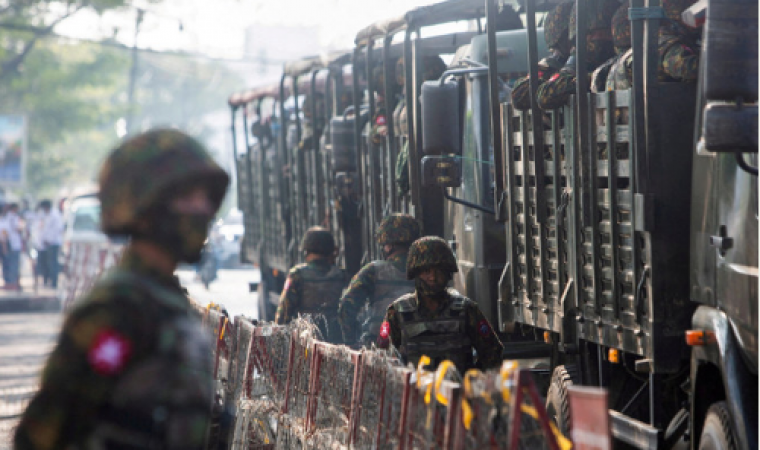
Burma: A UN human rights expert's recent call for the United States to impose stronger sanctions on Myanmar's military rulers has brought renewed attention to the ongoing crisis in the Southeast Asian nation.
Tom Andrews, the UN Special Rapporteur on the situation of human rights in Myanmar, emphasized the need for targeted measures against the junta, including their primary revenue source, the state oil and gas enterprise.
This article examines the implications of strengthening sanctions on Myanmar's junta and the complex factors at play in determining the course of US policy towards the military regime.
Also Read: Urgent Action Needed to Safeguard High Seas as Threats Escalate, Warns Greenpeace
Sanctions imposed by the United States on Myanmar's junta, following the military coup in February 2021, have had limited impact on deterring the regime's actions against the Burmese people.
Critics argue that these sanctions have not been comprehensive enough and have failed to directly target the junta's main revenue streams.
The UN's Special Rapporteur, Tom Andrews, contends that the junta is unlikely to halt its human rights abuses until it genuinely feels the economic consequences of its actions. In his view, the United States can and should take more forceful measures to exert pressure on the military rulers.
Andrews has urged the US to broaden sanctions by including the Myanma Oil and Gas Enterprise (MOGE) within their scope. MOGE stands as the junta's primary source of revenue, and targeting it could significantly impact the regime's financial capabilities.
Additionally, he has called for a complete ban on imports from Myanmar and the freezing of assets belonging to the junta's leadership.
Also Read: US Military Resumes Counterterrorism Operations in Niger
Since seizing power in February 2021, the junta has undertaken a harsh crackdown on dissent, resulting in the deaths of hundreds and the detention of thousands more. Furthermore, the regime has faced allegations of widespread human rights violations, including torture, sexual violence, and forced displacement.
The Biden administration has been among the most outspoken critics of the junta's actions. In response to the coup, the US government imposed sanctions on Myanmar's military leadership and voiced its support for the restoration of democracy in the country.
Stricter sanctions could further cripple Myanmar's economy, potentially exacerbating the suffering of the population. This is a key concern for policymakers, as the impact of sanctions tends to be felt most acutely by the people rather than the ruling elite.
The United States will need to navigate its relationships with other countries in the region, especially China and ASEAN nations, which have strategic interests in Myanmar. Sanctions may affect these diplomatic ties.
Past experiences with sanctions have shown that while they can apply pressure, they do not guarantee a change in behavior. Careful evaluation is required to assess the effectiveness of such measures.
Balancing the imperative to address human rights abuses with the need to ensure the well-being of the population is a delicate task. The US government must consider how sanctions may impact access to essential goods and services.
Collaborating with international partners and organizations, such as the UN, can enhance the impact of sanctions and build a coordinated response to the crisis.
Strengthening sanctions, particularly by targeting MOGE, could raise the economic costs for the junta's leadership, potentially forcing them to reconsider their actions.
Care must be taken to ensure that sanctions do not exacerbate the humanitarian crisis in Myanmar. Providing humanitarian aid and support to civil society organizations is essential to mitigate any adverse effects on the population.
The United States will need to carefully manage its relationships with other regional and global actors, as they may have differing interests in Myanmar.
Also Read: President Biden Faces House Impeachment Inquiry Amidst Political Turmoil
The junta's response to intensified sanctions is uncertain. It may choose to double down on its authoritarian actions, negotiate with the international community, or seek alternative sources of revenue.
The call by the UN's Special Rapporteur for the United States to strengthen sanctions against Myanmar's junta underscores the urgency of addressing the human rights crisis in the country. While sanctions can be a tool to pressure the regime, they must be implemented judiciously to avoid exacerbating the suffering of the Burmese people.
The decision to expand sanctions requires a careful balancing act, considering economic, diplomatic, humanitarian, and multilateral dimensions. Ultimately, the goal is to achieve a peaceful resolution to the crisis, restore democracy, and protect the rights and well-being of the people of Myanmar. The international community's response, led by the United States, will play a pivotal role in shaping the future of the nation.